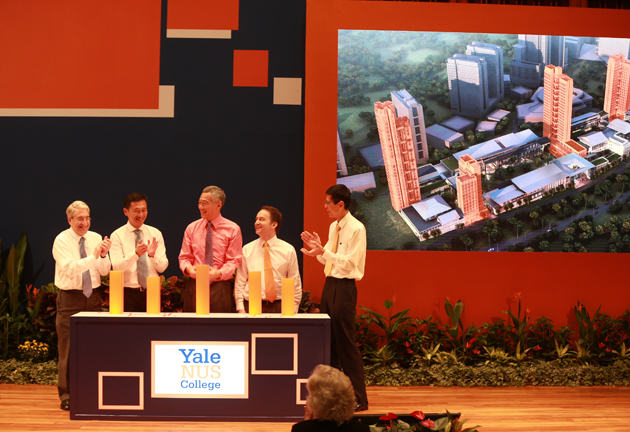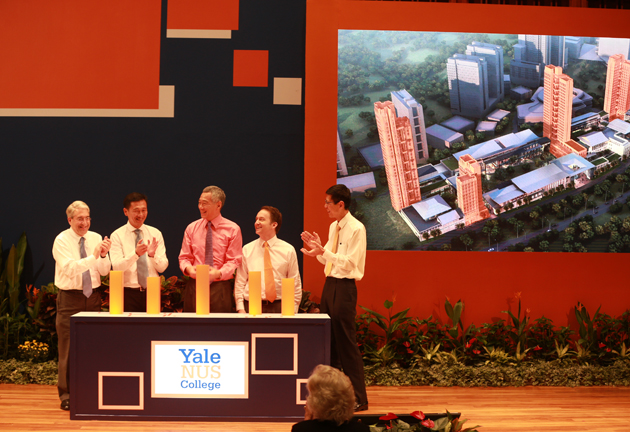Speech by Prime Minister Lee Hsien Loong at the Inauguration of the Yale-NUS College Campus on 12 October 2015.
Distinguished guests, ladies and gentlemen, I am very happy to be here today to open the Yale-NUS College campus. It is the first, unique, liberal arts college in Singapore. I came for the launch of the College in 2011, I attended the ground-breaking ceremony a year later, in 2012, and I am very happy to be here a third time, far from the last, to open the campus, and to see it done. Congratulations.
Educational Landscape
We have been steadily growing our tertiary educational sector in Singapore, making it more diverse, to offer Singaporeans many pathways to explore and to chase their aspirations. We upgraded the Institute of Technical Education and our Polytechnics, and created more specialised courses for students and adult learners. We built new universities and expanded the range of their courses. Most importantly, we developed institutions with different foci, different characters, and different roles. We started with the National University of Singapore (NUS), and Nanyang Technological University (NTU), then we built Singapore Management University (SMU) focusing on social sciences and management. We built the Singapore University of Technology and Design (SUTD) to provide design-oriented, MIT-styled engineering education. We have started the Singapore Institute of Technology (SIT) and SIM University (UniSIM) offering applied learning degrees. Within each of these universities, we diversified and customised learning and teaching, to suit the wide range of students with different aptitudes and interests. We also encouraged our universities to strike up international partnerships in niche areas. So we have the Duke-NUS Graduate Medical School, we have got the Yong Siew Toh Conservatory of Music here at NUS, jointly with the Peabody Institute of John Hopkins University. We have the Lee Kong Chian School of Medicine at NTU with Imperial College London, and now the Yale-NUS College.
Value of Yale-NUS College
The Yale-NUS College adds something different and valuable to Singapore’s educational eco-system. It offers a unique experience for students, with its broad-based liberal arts programme, drawing on the intellectual traditions of Yale, requiring students to study a broad range of subjects in their first two years, including natural and social sciences, humanities and the arts, before choosing their majors. It will train students to think critically across disciplines, and build up their communication and leadership skills. Our other universities also train students to think critically and build leadership skills, but Yale’s approach is different. Yale has been very successful in the US context. If we can adapt it successfully to Singapore, to our context, we will have created another pathway for our students. The Yale-NUS College’s success will also benefit the rest of our tertiary education system because the innovative ideas, their pedagogy, their new learning approaches, these will spread, and other institutions will learn and will seek to outdo Yale-NUS. Our students will benefit from the competition. We hope that the Yale-NUS College will also be relevant to students from other Asian countries, as well as other international students who wish to understand Asia. Because here, the students live and learn together all four years of their college life, as they do in Yale, or Oxford, or Cambridge, I should mention Harvard in fairness, within the NUS campus, and experience first-hand an Asian society – one which is changing, moving, adapting to the times. That is from Singapore’s point of view.
From Yale’s point of view, there is also value in this institution. Yale, of course, is already an outstanding institution in the US with an international reputation. But in Asia, a fast developing continent, Yale has a role to play, and Yale wishes to develop this role and invest in this. It is not so easy to achieve this in New Haven, on the other side of the world. It has to be in Asia, to feel the buzz of societies on the move, to respond to the zeitgeist, the issues, the priorities of a rising continent; also to experiment, and to adapt the Yale model to Asia. This will not succeed if Yale-NUS is just a carbon copy of Yale in New Haven. It has to be something creative, something different, something with the best elements of its parents – Yale and NUS – and hopefully, outdoing them. Therefore this is a learning journey for both partners. We are building an institution here that is relevant and valuable both to the hosts in Asia and to intellectual parents in the US.
Asia is different from America. Globalisation and technology are changing the way we live, presenting many countries with similar challenges – income inequality, wage stagnation, youth unemployment, ageing population, rapid economic, social and political change. But while the challenges are similar, the countries are not converging on a single universal social or political model that will best deal with these challenges under all circumstances, because each country is different, and has different situations – different natural endowments, different historical experiences, different geopolitical circumstances, different social structures, cultures and values. Each therefore faces different constraints and has different possibilities open to it. None can stay static, but each will have to find its own way forward.
Yale-NUS therefore needs a curriculum and a college ethos that respond to this regional context. Its graduates have to understand these countries, have a feel of how they work, what they need, how they can move forward. Not just a theoretical, intellectual understanding on paper, but actual experience living in Asia, interacting with fellow students from the region, and outside, ideally seeing more than one country, and having a chance to intern in several of them too. Then they can be effective working in these countries, and helping them to change and adapt to a rapidly changing world.
Good Start
So I am glad that the College is off to a good start and that the makeup of your student community reflects the purpose of your College. You have now already more than 500 students from nearly 40 countries; all continents are covered, except Antarctica. They said six, so I said, “Which one was missing?” They said, “Antarctica.” Majority are from Asian countries, more than half are from Singapore, and a good number are from countries all over the world. We have students from Ghana, we have students from Trinidad and Tobago, and a number from the US and Europe as well. This diversity of cultures and backgrounds adds to the richness of the student experience. It is an important element of the Yale-NUS College’s conception, of the idea of what it has to be, because students have to learn to work with classmates from different cultures, adapt better to the differences and pick up soft skills, adjusting to this open and diverse environment.
We have attracted good students and the standard are very high. Many had offers from leading universities in other countries, but chose Yale-NUS. Yale-NUS is also popular with students from Singapore. For example, Isabelle Li, one of our top table tennis players and a Public Service Commission scholarship recipient enrolled this year, and many others too, which shows that Yale-NUS is making a name for itself, and it is attractive compared to its peers in the world.
It is still early days yet, your students have not quite graduated, 2017 will be the first class, but I am glad that already the students actively serving the community and integrating into Singapore. I am happy to hear of stories of the students making waves, like Valerie Pang and Manas Punhani from the Class of 2017, who are volunteering with SDI Academy to help migrant workers here learn English and integrate better with their working colleagues. Their efforts have earned them a $50,000 start-up grant in the DBS-NUS Social Venture Challenge Asia, which will enable them to help more migrant workers in Singapore.
I have every confidence that in time, Singaporean graduates of Yale-NUS will go on to make valuable contributions to our society, in their own careers and professions, as active citizens serving the wider community, making a contribution in Singapore and operating well in other continents – Asia, Europe, America, Africa. The Yale-NUS education would have given them a cosmopolitan exposure, while strengthening their roots in Singapore.
I am sure the international students will make their marks too. Those who choose to stay in Singapore and perhaps even sink roots here, we welcome them, as they will have gained a good understanding of Singapore, our culture, and our environment. Those who eventually return to their home countries, or pursue opportunities and passions elsewhere, I hope they will thrive in their careers, and contribute to their own societies. I hope that whichever path they take, they will remain part of Singapore’s extended family, and always be friends of Singapore. Yale-NUS would have been an important chapter in their lives, shaped who they are, never to be forgotten, as a place where they formed friendships with other classmates and stored up many good memories and important skills for life.
On this happy occasion, I would like to thank all of you who have made the Yale-NUS collaboration a reality. First, the Chairman, Mdm Kay Kuok and Governing Board members for the stewardship and their commitment, also the leadership of Yale University, President Emeritus Richard Levin. Rick is happily with us here today, who strongly supported the setting up of the College, understood what it took, invested the time and effort to make it happen. Without him, this collaboration would not have borne fruit. Also President Peter Salovey, who took the collaboration further, implemented the concepts and plans, and brought us all the way here today. NUS President Tan Chorh Chuan, who believed in the College and saw how it could benefit Singapore. President Pericles Lewis and the faculty and staff, who have worked tirelessly with the students, and I do not doubt, with the bureaucracy as well. The “pioneer generations” of Yale-NUS students, for trusting the new College and making this your home for four years, and the donors and well-wishers for your generosity and support.
So I would like to congratulate Yale-NUS on the inauguration of your new campus. The Government remains committed to this bold collaboration. I am confident that you will build on your strong start, and create a unique model of academic excellence in Singapore; nurturing leaders of tomorrow, contributing to the wider community, and making an impact in Singapore, in Asia and in the world.
Go forth and change the world. Thank you very much.
* * * * *
Explore recent content
Explore related topics


